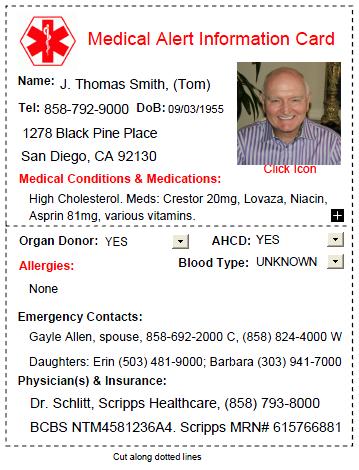8 Reasons Why You Need A FREE Medical Alert Card
A Medical Alert Card Can Save Your Life. Learn Why All Your Family Members Should Have One.
A Medical Alert Card is one of the most positive steps you can take to protect your family in an emergency. As a personal injury lawyer, I handle hundreds of insurance claims for injured accident victims. As you can imagine, I become intimate with the details of these accidents…. from police reports, medical records, accident scene photos/video, and witness accounts, etc. I offer a unique perspective as a Portland accident attorney. While the majority of my blog articles are geared towards helping victims and their families after an accident, I’d like to contribute to preventative and safety topics as well.
As part of my series on safety and accident preparedness, this entry will focus on the importance of medical alert information cards.
>> Download Your FREE Medical Alert Card
As a public service, I have created a free, downloadable Medical Alert Card template for you to use. These cards help ensure your family’s safety and wellness in the event of a medical emergency or accident. The form is downloaded to your computer with a copy saved for each family member, filled out using the free Adobe Acrobat Reader, saved and printed. Create as many copies as you need: one for your wallet or purse, each car, and in the kid’s backpacks.
The template is a downloaded pdf fillable form which you can save to your computer. You can maintain and save a unique form for each family member. Once you have saved the form to your computer, you simply double click on the form icon and the template will automatically open using Adobe’s Acrobat Reader. Because the pdf template is a fillable form, you must have the free software from Adobe to add your personal information (if you do not have Acrobat Reader you can download this software free here). Follow the simple instructions to add the most important medical alert information, including a picture of the applicable family member.
Card For Wallet: Download Free Medical Alert Information Card >>
Longer Version: Download Free Medical Alert Information Form >>
Consider This….
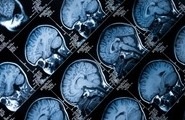
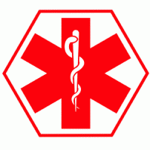
Paramedics/ EMS personnel are trained to look for Medical Alert Information including bracelets, pendants, and stickers on car windows, refrigerators, and entryway doors. They know this is key to quickly finding important life-saving medical information.
Who Needs A Medical Alert Information Card?
In my opinion, everyone can benefit by keeping a medical alert information card in their wallet, especially if you have a health condition, severe allergy, or are taking medications that could change how a first responder administers emergency care. Here are eight benefits of carrying a Medical Alert Information card:
1) Communicate vital life-saving information to first responders and emergency room doctors WHEN YOU CANNOT
2) Prevent drug interactions
3) Save time and improve the medical diagnosis
4) Eliminate complications from allergies
5) Communicate emergency contact, patient advocate, and insurance information
6) Provide access to hospital and physician medical records
7) Communicate your wishes – organ donor, Do-Not-Resuscitate directive, Advance Health Care Directive
8) Save Your Life!
Where Should A Medical Alert Information Card Be Kept?
This Medical Alert Information form and/or card can be placed in several locations such as your wallet, car glove compartment, on the side of your refrigerator, and at your place of work – locations where an accident may occur. For more severe conditions, medical alert bracelets can also be used to rapidly identify health concerns and direct emergency personnel your card. For example, your medical bracelet could read, “medication controlled” or “see wallet card for medical history.”
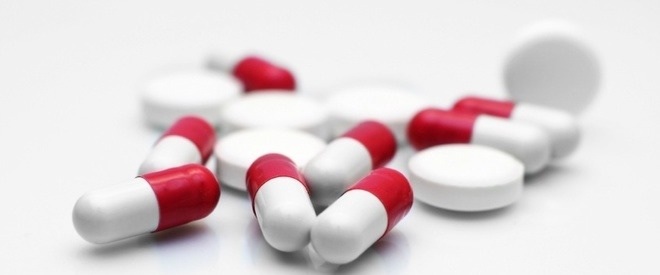
Sample Scenarios:
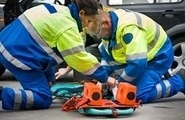
In addition to a Medical Alert bracelet or other emergencies “tags” on the patient, it would have been critical for him to carry a Medical Information Card in his wallet next to his driver’s license and health insurance card. Instructions that read, “do not use standard spinal precautions” could have been added to the inscription.
Here is another scenario: Did you know that gastric bypass surgery patients should limit their exposure to NSAIDS (non-steroidal anti-inflammatory drugs including aspirin and ibuprofen) and sugars? Simple sugars may cause a problem called dumping syndrome because food moves too quickly through the stomach and intestines. It can cause shaking, dizziness, rapid heart rate, and more.
The amount of information included on the card is up to the individual and should be based on his/her specific needs. In less extreme cases, these cards can be as simple as contact numbers in case of an emergency (ICE) and pediatrician information for your children. What if you were unconscious and taken to a different hospital than your children?
Taking small steps to prepare for an unwanted accident can make a huge difference in your outcome and recovery. I have seen many cases where a medical information card would have helped the situation tremendously. If you have other suggestions on how to prepare for an accident, I’d love to hear from you.
MEDICAL ALERT INFORMATION CARD INFOGRAPHIC:
(click on infographic to view large)
About Mayor Law, LLC:


